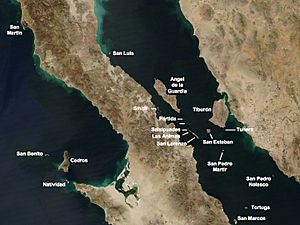San Esteban Island facts for kids
| Geography | |
|---|---|
| Location | Gulf of California |
| Coordinates | 28°41′51″N 112°34′39″W / 28.69750°N 112.57750°W |
| Administration | |
|
Mexico
|
|
| State | Sonora |
| Demographics | |
| Population | Uninhabited |
San Esteban Island (also known as Isla San Esteban in Spanish) is a small island in the Gulf of California, Mexico. It is located southwest of Tiburón Island. This island is part of the Hermosillo area in the state of Sonora.
San Esteban Island covers about 39.773 square kilometers (15.356 square miles). This makes it the 15th largest island in Mexico. Long ago, a group of the Seri people used to live on the island. Today, no one lives there permanently.
Contents
Unique Animals of San Esteban
San Esteban Island is special because it is home to many rare animals. These animals are found on only a few islands in the world. The island's dry, rocky environment is perfect for certain reptiles.
San Esteban Chuckwalla
One of the most famous animals here is the San Esteban chuckwalla (Sauromalus varius). This is a large, plant-eating lizard. It can grow quite big and has a flat body. Chuckwallas are known for hiding in rock crevices. They inflate their bodies to wedge themselves in tightly, making it hard for predators to pull them out.
Spiny Chuckwalla
Another type of chuckwalla found here is the spiny chuckwalla (Sauromalus hispidus). Like its cousin, it also lives among the rocks. These lizards are well-adapted to the desert heat. They spend their days basking in the sun and eating plants.
Spiny-tailed Iguana
You can also find the spiny-tailed iguana (Ctenosaura conspicuosa) on San Esteban Island. These iguanas have rough, spiny tails. They use their tails for defense against other animals. They are quick and can climb well, often found near rocky areas or in trees.
Island Environment
The island has a desert climate, meaning it is very dry and hot. Despite this, it supports a unique ecosystem. The plants and animals living here have special ways to survive with little water. This makes San Esteban Island an important place for scientists to study how life adapts to harsh conditions.
See also
 In Spanish: Isla San Esteban para niños
In Spanish: Isla San Esteban para niños
 | Emma Amos |
 | Edward Mitchell Bannister |
 | Larry D. Alexander |
 | Ernie Barnes |



